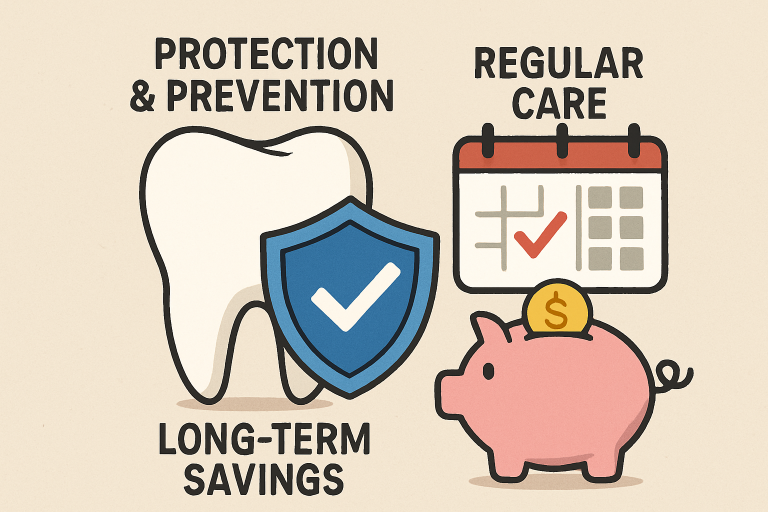Key Takeaways
- Preventive dental care can greatly reduce medical costs over a lifetime.
- Regular dental checkups and cleanings are essential for early detection of oral health issues.
- Oral health plays a critical role in overall wellness, affecting conditions like heart disease and diabetes.
- Proactive care and healthy habits help avoid emergency dental expenses.
- Accessible dental resources and education empower healthier communities.
What Is Preventive Dental Care?
Preventive dental care focuses on maintaining optimal oral health and intercepting dental issues before they develop into significant and costly problems. This approach includes a range of services such as professional exams, cleanings, x-rays, and the application of sealants to protect teeth from decay. For people of all ages, regular preventive care creates a foundation for lifelong dental health, allowing individuals to sidestep common oral health challenges.
Embracing preventive dentistry not only protects your teeth but also has a positive effect on your overall health and finances. You reduce your risk for extensive treatments and unexpected emergency expenses by scheduling regular checkups and adopting preventive habits. Those looking for reliable dental coverage can explore options at https://www1.deltadentalins.com/federal.html, which offers comprehensive plan solutions designed to make preventive services accessible and affordable.
How Consistent Care Lowers Long-Term Costs
One major advantage of ongoing preventive care is its significant impact on long-term savings. The cost of regular cleanings or routine dental exams is a fraction of what emergency treatments—for advanced cavities, root canals, or oral surgeries—may cost. Studies by the CDC show that every dollar spent on preventive dental care saves up to $50 on restorative and emergency procedures later. These savings accumulate over a lifetime, creating a compelling case for scheduling preventive visits over waiting for problems to arise.
People who prioritize preventive care experience fewer missed workdays and less disruption to daily life, as oral health issues are managed early and efficiently. This means less time and money spent on dental emergencies, pain relief, and complex restorative treatments, providing economic and quality-of-life benefits.
Early Detection: Catching Problems Before They Escalate
Routine visits to the dentist allow for the early identification of common dental issues such as small cavities, emerging gum disease, and oral lesions. Regular screenings can uncover these problems while they are easily treatable, saving patients from the pain and cost of advanced procedures later. For example, catching a cavity early can often be resolved with a simple filling, while neglect can ultimately require a root canal or tooth extraction.
If left untreated, dental diseases can contribute to larger health system burdens by increasing the risk of infection, hospital visits, and chronic health conditions. Implementing routine preventive care strategies, such as those encouraged by the American Dental Association, helps individuals avoid escalating oral and systemic health issues.
The Connection Between Oral Health and Chronic Diseases
Modern research underscores the profound effect oral health has on overall well-being. Numerous studies have established a strong association between poor dental health and chronic diseases, including diabetes, heart disease, and certain respiratory illnesses. Inflammation and bacteria originating in the mouth can travel through the bloodstream, potentially exacerbating all-body inflammation and leading to systemic complications.
Dental professionals are often among the first to spot warning signs of these conditions during routine checkups, supporting the case for integrated preventive dental visits as a pillar of maintaining broader health.
Developing and Maintaining Healthy Dental Habits
Establishing consistent oral hygiene routines is crucial at any age. For children, brushing twice daily with fluoride toothpaste, flossing, and receiving dental sealants lay a strong foundation. Adults benefit from sticking to these habits, as well as regular professional cleanings and attention to diet—limiting sugary foods and drinks that promote tooth decay. Seniors, meanwhile, should be vigilant about gum health and replacement options for missing teeth.
Drinking fluoridated water and choosing tooth-friendly snacks high in fiber can also enhance oral health outcomes. Community water fluoridation, widely endorsed by major health organizations, continues to play a key role in reducing cavities at the population level.
How Preventive Care Reduces Dental Anxiety and Emergencies
Untreated dental problems can escalate quickly, often leading to painful and costly emergencies that may require urgent care and even hospitalization. Prevention—through regular dental visits—greatly reduces the likelihood of these crises, offering peace of mind and cost savings. Moreover, routine visits build familiarity with the dental office and staff, which can significantly lower dental anxiety.
Research highlights that patients who feel comfortable and empowered by their dental care routines are less likely to delay needed treatment or experience dental fear, promoting better health outcomes and a more positive outlook on oral care. Guidance from dental professionals plays an important role in dispelling anxiety by providing reassurance, education, and developing personalized care plans.
Community Benefits and Access to Preventive Care
When entire communities prioritize preventive dental care, the collective benefits are substantial. Schools and workplaces that offer dental education, screenings, and access to preventive services see lower absenteeism, higher productivity, and overall improved health outcomes. Preventive dentistry also promotes equity in health by addressing disparities in access and education that disproportionately affect low-income and marginalized populations.
Despite the benefits, many individuals face barriers to accessing preventive care, such as a lack of insurance, limited transportation, or a shortage of providers in their area. Expanding public awareness and investment in preventive services is key to ensuring all individuals and communities can enjoy the benefits of a healthy smile.
Conclusion: Investing in a Healthy Smile
Preventive dental care is a powerful investment in your future, leading to long-term cost savings, better health, and peace of mind. By making regular dental visits, practicing daily oral hygiene, and supporting community initiatives for equity and access, you set the foundation for wellbeing that extends far beyond your smile. Prioritizing preventive dental care today paves the way for a healthier, happier tomorrow.


